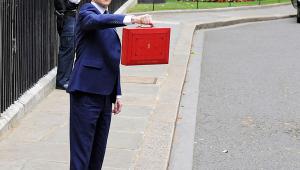18 March 2005
The 'Iron Chancellor' believes he answered the critics who questioned his management of the public finances, but experts have warned his Budget might not prevent post-election tax rises.
Gordon Brown said: 'Those who have called our spending unaffordable have been consistently wrong and… today they are wrong again.'
He also dismissed suggestions that world events had put the UK's economic stability at risk. 'It is because our public finances are strong that in this Parliament we have been able to meet the extra costs of Iraq, Afghanistan and the fight against terrorism – £4.9bn,' he claimed.
However, Conservative leader Michael Howard claimed that taxes would have to rise 'by 3p in the pound' to cover increased borrowing against Brown's previous Budget projections.
Carl Emmerson, deputy director of the Institute for Fiscal Studies, told Public Finance that the government might have to raise an additional £11bn 'if the chancellor's projected post-election surpluses… do not materialise'.
Delivering his speech on March 16, Brown milked his announcement that economic growth had met the Treasury's oft-criticised forecasts, used to justify generous spending settlements in recent years.
He projected growth of 3% to 3.5% this year followed by 2.5% to 3% for 2006/07. 'Most recently, the Budget forecast for 2004 of growth at or above 3%,was said to be a deliberate misrepresentation of Britain's economic position,' he said.
'Not to meet it, it was said, would destroy credibility. I can report that growth in 2004 was as forecast, 3.1%.'
Brown also denied there was a 'black hole' in public finances. Recent studies by the Organisation for Economic Co-Operation and Development have supported IFS estimates that Brown's spending plans, borrowing and disputable revenue estimates could leave
the UK around £11bn below Treasury economic projections, putting Brown's self-imposed fiscal rules at risk.
His first rule is to balance the current budget over the course of the economic cycle. He told the Commons he believes he would meet that by £6bn this year.
But a spokesman for the Conservative Party said: 'If you take out the ONS's recent reclassification of £2.1bn of road maintenance, the difference of just £3.9bn represents a significant reduction in the margin for the golden rule previously predicted by the chancellor.'
Brown also estimated that his second fiscal rule – to keep national debt below 40% of national income – would be met 'with a margin of £57bn'.
PFmar2005




















